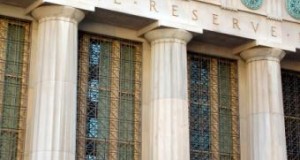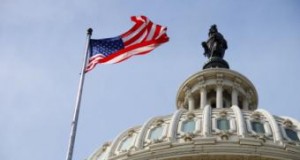Members of the Federal Open Market Committee decided Wednesday to keep interest rates between 0 percent and .25 percent until 2014, even while the economy steadily improves. All but one of the Fed├â┬ó├óÔÇÜ┬¼├óÔÇ×┬ós governors voted to extend the policy enacted last fall for another two years, where originally the central bank had determined to delay higher interest rates until 2013. The Fed said that it made the decision in lieu of evidence from December that showed unemployment remaining steady. Experts disagree over whether low interest rates will help the market.
Read More »Witnesses Criticize, Call for Repeal of Volcker Rule
Witnesses testifying before the House Financial Services Committee Wednesday warned lawmakers that the controversial Volcker Rule could tighten bank liquidity and make U.S. financial institutions less competitive with banks overseas. Once finalized by regulators, the rule ├â┬ó├óÔÇÜ┬¼├óÔé¼┼ô unless modified or repealed by lawmakers ├â┬ó├óÔÇÜ┬¼├óÔé¼┼ô will enact a provision under the Dodd-Frank Act that prohibits U.S. banks from engaging in short-term proprietary trading practices. Douglas Elliott, a fellow with the Brookings Institution, called for an outright repeal of the Volcker Rule.
Read More »Experts: Basel III Will Mean Higher Borrowing Costs
Earlier Tuesday the FDIC went forward with a notice of proposed rulemaking in the Federal Register that calls for annual stress tests to determine capital adequacy for banks. The notice built on the Basel Accords, which the Basel Committee on Banking Supervision revisited with help from a consortium of central bankers over 2010 and 2011. Basel III is the latest by BCBS to require stress tests for systemically important financial institutions, which include Bank of America, Citigroup, JPMorgan Chase, Wells Fargo, and several other U.S. lenders.
Read More »FOMC’s November Minutes Reflect Euro Crisis Concerns
With the euro zone crisis deepening, members of the Federal Open Market Committee elected to stay the course in November by keeping interest rates historically low and pooling investments from agency debt into agency mortgage-backed securities. Minutes framed discussions around concerns about weakening confidence in the markets as a result of any potential default by euro zone nations, even while the U.S. economy signaled that it would continue climbing out of the financial crisis. Europe helped rattle markets and compel the Fed's action in 2011.
Read More »FOMC Keeps Interest Rates at 0%
Acknowledging improvements in the larger economy, the Federal Open Market Committee said Tuesday that it would keep a heel on zero interest rates and continue shepherding funds from mortgage-backed securities into agency mortgage-backed securities. The rate for federal funds remains between zero interest and .25 percent since December, and follows an earlier decision by the Fed to buy up $400 billion in Treasuries to ensure lower borrowing costs.
Read More »Reports: Fitch May Downgrade Fannie, Freddie
A failure by lawmakers to slash $1.2 trillion from the national debt spurred Fitch Ratings to place U.S. debt on negative outlook Monday, a move that immediately hit GSEs Fannie Mae and Freddie Mac by association. The ratings agency revised a stable outlook for debt held by Fannie and Freddie to negative, even while it reaffirmed AAA-ratings in place for the GSEs. Multiple news reports suggest that Fitch will likely downgrade credit ratings for the U.S. federal government, along with Fannie and Freddie.
Read More »Senator Proposes Bill to Wean GSEs Off Federal Funds
Fielding more pressure for housing finance reform, Sen. Bob Corker (R-Tennessee) introduced a bill Wednesday that aims to decouple government assistance from the GSEs and shore up private-sector involvement in mortgage markets. The bill, titled the Residential Mortgage Market and Privatization Act, proposes gradually reducing the percentage of principal in the GSEs├â┬ó├óÔÇÜ┬¼├óÔÇ×┬ó mortgage-backed securities, streamlining underwriting standards and origination databases, and removing federal guarantees to create a much-discussed to-be-announced market.
Read More »Furor Mounts Over $13M in GSE Exec Bonuses
Fannie Mae and Freddie Mac remain under scrutiny in the wake of large salaries and bonuses for their executives, as lawmakers from both major parties mount a rare joint effort to criticize the GSEs and their federal regulator. No less than 60 senators a total of 35 Republicans and 25 Democrats crossed the aisle to circulate a letter Friday that denounced the Federal Housing Finance Agency for signing off on $12.79 million in bonuses for ten executives with the GSEs. Furor over the bonuses follows a string of changes for Freddie Mac.
Read More »October Payrolls Add 80K, Chipping at Unemployment
Nonfarm payrolls counted more than 80,000 new jobs for the economy over October, slashing the unemployment rate by a few percentage points but at a clip that analysts say will marginally improve an otherwise uncertain economic outlook. The Labor Department reported Friday that the jump to more than 100,000 new jobs over September - a facelift driven largely by a return to work by striking Verizon employees - slid back to new figures with few surprising numbers for several industries.
Read More »Policymakers See GSE-Free Future as Freddie Asks for $6B
The head of the agency that regulates the GSEs addressed one lawmaker's recent proposal to eliminate the federal lifeline for Fannie Mae and Freddie Mac Thursday even as the latter filed staggering third-quarter losses and requested another $6 billion in taxpayer funds. Federal Housing Finance Agency Acting Director Edward DeMarco and several others testified before the House Subcommittee on Capital Markets, which heard the chief regulator describe why the federal government needs to slowly phase out taxpayer support for the GSEs.
Read More » theMReport.com Your trusted source for mortgage banking news
theMReport.com Your trusted source for mortgage banking news







